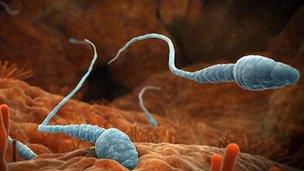Chemicals in environment 'damaging male fertility'
- Published

The team wants to find out why some men's fertility may be affected more than others
New evidence has emerged that suggests chemicals routinely found in the environment could be damaging fertility in some men.
Researchers tested sheep that had been exposed to chemicals such as cosmetics, detergents and pollutants.
They found "abnormalities that could result in low sperm counts in 42% of the animals".
The study, by Glasgow, Edinburgh and Aberdeen Universities, was published in the International Journal of Andrology.
All life on the planet is constantly exposed to a range of naturally-occuring and man-made chemicals.
IVF demand
Some of the man-made chemicals can interfere with communication systems within the body and potentially have adverse effects on health and wellbeing.
It has been suggested that some may also be responsible for lowering male sperm count and could possibly explain the rise in demand for in-vitro fertilization (IVF) in humans.
The Scots universities team was joined in its research by scientists from the French National Institute for Agricultural Research (INRA).
They looked at the testicles of sheep that had been exposed to "a typical range of chemicals" encountered by humans from when their mothers were pregnant until after puberty.
Dr Michelle Bellingham, from Glasgow University said: "We were very surprised to find abnormalities that could result in low sperm counts in the testicles in 42% of the animals.
"The changes were not the same in all affected individuals and they were not obvious from the size of the testicles or from the concentration of male hormones in the blood."
Prof Paul Fowler, from Aberdeen University, added: "The key now is to work out why these everyday chemicals affect some individuals more than others."
Prof Neil Evans, also from Glasgow University, said: "These findings emphasize that even when the concentration of single chemicals in the environment may be very low, it is hard to predict what the health effects are when an individual is exposed to a mixture of chemicals."
Prof Evans said the findings added to previous work that found an effect on both male and female reproductive systems when their mothers were exposed to the relevant mixture of chemicals.
- Published14 March 2012
- Published19 January 2011
- Published30 September 2010